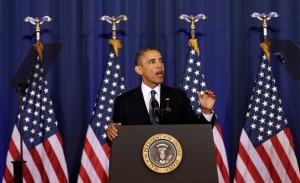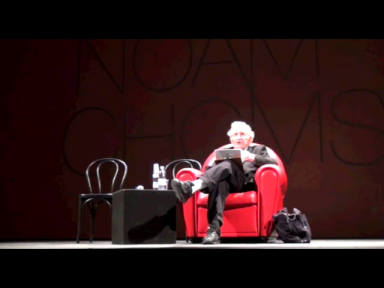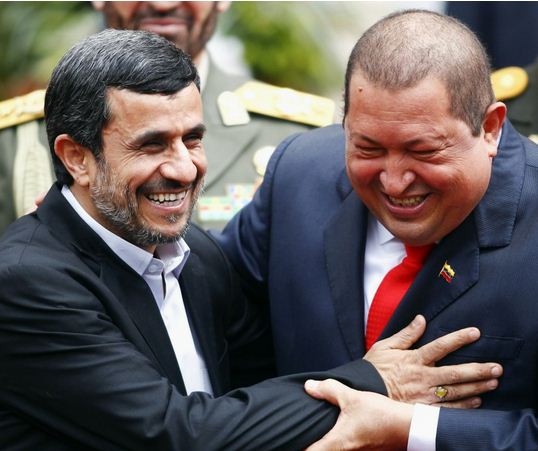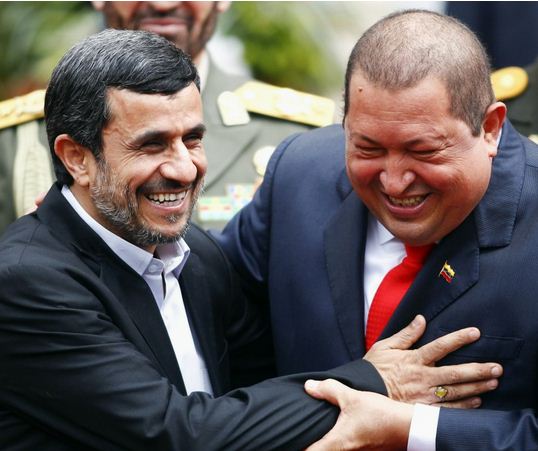Video: President Obama’s speech on counterterrorism at National Defense University in Washington, D.C. touched on drones, renewed efforts to close Guantanamo Bay, and was interrupted by CODEPINK’s Media Benjamin heckling loudly [1].
[youtube https://www.youtube.com/watch?&v=Yt1gpFJFZvQ]
Highlights from Washington Post’s full transcript.
Americans Ambivalent After Over a Decade at War
Americans are deeply ambivalent about war, but having fought for our independence, we know a price must be paid for freedom.We have now been at war for well over a decade. I won’t review the full history. What is clear is that we quickly drove al-Qaida out of Afghanistan, but then shifted our focus and began a new war in Iraq. And this carried significant consequences for our fight against al-Qaida, our standing in the world and, to this day, our interests in a vital region.
Use of Torture and Illegal Detention Compromises American Values
 Meanwhile, we strengthened our defenses. Most of these changes were sound. But some, like expanded surveillance, raised difficult questions about the balance that we strike between our interests in security and our values of privacy. And in some cases, I believe we compromised our basic values — by using torture to interrogate our enemies, and detaining individuals in a way that ran counter to the rule of law.
Meanwhile, we strengthened our defenses. Most of these changes were sound. But some, like expanded surveillance, raised difficult questions about the balance that we strike between our interests in security and our values of privacy. And in some cases, I believe we compromised our basic values — by using torture to interrogate our enemies, and detaining individuals in a way that ran counter to the rule of law.
No Large-Scale Attacks on the US Since 9/11
Today Osama bin Laden is dead, and so are most of his top lieutenants. There have been no large-scale attacks on the United States, and our homeland is more secure. Fewer of our troops are in harm’s way, and over the next 19 months they will continue to come home.
Our nation is still threatened by terrorists. But we recognize that the threat has shifted and evolved from the one that came to our shores on 9/11. With a decade of experience to draw from, this is the moment to ask ourselves hard questions about the nature of today’s threats and how we should confront them.
[O]ver the last decade, our nation has spent well over a trillion dollars on war, helping to explode our deficits and constraining our ability to nation-build here at home. Our service members and their families have sacrificed far more on our behalf.
From our use of drones to the detention of terrorist suspects, the decisions we are making will define the type of nation and world that we leave to our children.
America is at a crossroads
We must define the nature and scope of this struggle, or else it will define us.
Neither I nor any president can promise the total defeat of terror. [We must] dismantle networks that pose a direct danger to us and make it less likely for new groups to gain a foothold.. From Yemen to Iraq, from Somalia to North Africa, the threat today is more diffuse, with al-Qaida’s affiliates in the Arabian Peninsula, AQAP, the most active in plotting against our homeland.
Unrest in the Arab world has also allowed extremists to gain a foothold in countries like Libya and Syria. ..we continue to confront state- sponsored networks like Hezbollah that engage in acts of terror to achieve political goals. Other of these groups are simply collections of local militias or extremists interested in seizing territory. And while we are vigilant for signs that these groups may pose a transnational threat, most are focused on operating in the countries and regions where they are based. And that means we’ll face more localized threats like what we saw in Benghazi, or the BP oil facility in Algeria, in which local operatives — perhaps in loose affiliation with regional networks — launch periodic attacks against Western diplomats, companies and other soft targets, or resort to kidnapping and other criminal enterprises to fund their operations.
The Future of Terrorism: Home-Grown Threats, Soft Target Attacks Abroad
And finally, we face a real threat from radicalized individuals here in the United States.
Deranged or alienated individuals, often U.S. citizens or legal residents, can do enormous damage, particularly when inspired by larger notions of violent jihad.
So that’s the current threat. Lethal, yet less capable, al-Qaida affiliates, threats to diplomatic facilities and businesses abroad, homegrown extremists. This is the future of terrorism.
[W]e have to recognize that these threats do not arise in a vacuum. Most, though not all, of the terrorism we face is fueled by .. a belief by some extremists that Islam is in conflict with the United States and the West and that violence against Western targets, including civilians, is justified in pursuit of a larger cause. Of course, this ideology is based on a lie, for the United States is not at war with Islam. And this ideology is rejected by the vast majority of Muslims — who are the most frequent victims of terrorist attacks.
We need all elements of national power to win a battle of wills, a battle of ideas.
First, we must finish the work of defeating al-Qaida and its associated forces.
In Afghanistan, we will complete our transition to Afghan responsibility for that country’s security.
Beyond Afghanistan, we must define our effort not as a boundless global war on terror but rather as a series of persistent, targeted efforts to dismantle specific networks of violent extremists that threaten America. In many cases, this will involve partnerships with other countries.
In Yemen, we are supporting security forces that have reclaimed territory from AQAP.
In Somalia, we helped a coalition of African nations push al-Shabab out of its strongholds.
In Mali, we’re providing military aid to French-led intervention to push back al-Qaida in the Maghreb
Much of our best counterterrorism cooperation results in the gathering and sharing of intelligence, the arrest and prosecution of terrorists.
[O]ur operation in Pakistan against Osama bin Laden cannot be the norm.
Drone Strikes Are Legal, Preferable to Doing Nothing, Will Reduce by 2015
[Drone] technology raises profound questions about who is targeted and why, about civilian casualties and the risk of creating new enemies, about the legality of such strikes under U.S. and international law, about accountability and morality. Simply put, these strikes have saved lives. ..America’s actions are legal. We were attacked on 9/11. Within a week, Congress overwhelmingly authorized the use of force. Under domestic law and international law, the United States is at war with al-Qaida, the Taliban, and their associated forces. [Yet] America’s legitimate claim of self-defense cannot be the end of the discussion. To say a military tactic is legal, or even effective, is not to say it is wise or moral in every instance… by the end of 2014 we will no longer have the same need for force protection, and the progress we have made against core al-Qaida will reduce the need for unmanned strikes.
U.S. strikes have resulted in civilian casualties… for the families of those civilians, no words or legal construct can justify their loss. [But to] do nothing in the face of terrorist networks would invite far more civilian casualties.. Remember that the terrorists we are after target civilians, and the death toll from their acts of terrorism against Muslims dwarfs any estimate of civilian casualties from drone strikes.
So doing nothing’s not an option.
[I]t is false to assert that putting boots on the ground is less likely to result in civilian deaths, or less likely to create enemies in the Muslim world.
Congress Is Briefed On Every Drone Strike But Oversight Must Increase
Not only did Congress authorize the use of force, it is briefed on every strike that America takes. [including the one on Anwar Awlaki]
For the record, I do not believe it would be constitutional for the government to target and kill any U.S. citizen … without due process. Nor should any president deploy armed drones over U.S. soil.
But the high threshold that we’ve set for taking lethal action applies to all potential terrorist targets, regardless of whether or not they are American citizens. This threshold respects the inherent dignity of every human life.
Now, going forward, I’ve asked my administration to review proposals to extend oversight of lethal actions outside of war zones that go beyond our reporting to Congress.
Foreign Aid – as Crucial as Force and Far Cheaper
[F]orce alone cannot make us safe. We cannot use force everywhere that a radical ideology takes root.
This means patiently supporting transitions to democracy in places like Egypt and Tunisia and Libya, because the peaceful realization of individual aspirations will serve as a rebuke to violent extremism. We must strengthen the opposition in Syria, while isolating extremist elements, because the end of a tyrant must not give way to the tyranny of terrorism.
We are actively working to promote peace between Israelis and Palestinians because it is right and because such a peace could help reshape attitudes in the region. And we must help countries modernize economies, upgrade education and encourage entrepreneurship because American leadership has always been elevated by our ability to connect with peoples’ hopes and not simply their fears.
For what we spent in a month in Iraq at the height of the war, we could be training security forces in Libya, maintaining peace agreements between Israel and its neighbors, feeding the hungry in Yemen, building schools in Pakistan and creating reservoirs of good will that marginalize extremists.
That has to be part of our strategy.
[W]e cannot neglect the challenge of terrorism from within our borders…this threat is not new… technology and the Internet increase its frequency, and in some cases its lethality… the best way to prevent violent extremism inspired by violent jihadists is to work with the Muslim American community, which has consistently rejected terrorism, to identify signs of radicalization, and partner with law enforcement when an individual is drifting towards violence.
And these partnerships can only work when we recognize that Muslims are a fundamental part of the American family. In fact, the success of American Muslims, and our determination to guard against any encroachments on their civil liberties, is the ultimate rebuke to those who say that we’re at war with Islam.
Investigating National Security Leaks Versus Press Freedom
You know, the Justice Department’s investigation of national security leaks offers a recent example of the challenges involved in striking the right balance between our security and our open society. I believe we must keep information secret that protects our operations and our people in the field. But a free press is also essential for our democracy. I’m troubled by the possibility that leak investigations may chill the investigative journalism that holds government accountable.
Journalists should not be at legal risk for doing their jobs. I have called on Congress to pass a media shield law to guard against government overreach. I’ve raised these issues with the attorney general [and directed him] to report back to me by July 12th.
Ditching AUMF, Closing Guantanamo
I look forward to efforts to refine and ultimately repeal the AUMF’s mandate. And I will not sign laws designed to expand this mandate further. Our systematic effort to dismantle terrorist organizations must continue. But this war, like all wars, must end. That’s what history advises. It’s what our democracy demands.
The original premise for opening Gitmo, that detainees would not be able to challenge their detention, was found unconstitutional five years ago. In the meantime, Gitmo has become a symbol around the world for an America that flouts the rule of law. Our allies won’t cooperate with us if they think a terrorist will end up at Gitmo. During a time of budget cuts, we spend $150 million each year to imprison 166 people, almost a million dollars per prisoner. And the Department of Defense estimates that we must spend another 200 million (dollars) to keep Gitmo open at a time when we are cutting investments in education and research here at home and when the Pentagon is struggling is struggling with sequester and budget cuts… there is no justification beyond politics for Congress to prevent us from closing a facility that should have never been opened.
Today I once again call on Congress to lift the restrictions on detainee transfers from Gitmo. I have asked the Department of Defense to designate a site in the United States where we can hold military commissions.
I am appointing a new senior envoy at the State Department and Defense Department whose sole responsibility will be to achieve the transfer of detainees to third countries. I am lifting the moratorium on detainee transfers to Yemen so we can review them on a case-by-case basis.
To the greatest extent possible, we will transfer detainees who have been cleared to go to other countries. Where appropriate, we will bring terrorists to justice in our courts and our military justice system. And we will insist that judicial review be available for every detainee.
[One remaining issue will be] how to deal with those Gitmo detainees who we know have participated in dangerous plots or attacks but who cannot be prosecuted, for example because the evidence against them has been compromised or is inadmissible in a court of law. But once we commit to a process of closing Gitmo, I am confident that this legacy problem can be resolved, consistent with our commitment to the rule of law.
And I know the politics are hard. But history will cast a harsh judgment on this aspect of our fight against terrorism and those of us who fail to end it. Imagine a future 10 years from now or 20 years from now when the United States of America is still holding people who have been charged with no crime on a piece of land that is not a part of our country.
Look at the current situation, where we are force-feeding detainees who are being held on a hunger strike. I’m willing to cut the young lady who interrupted me some slack because it’s worth being passionate about. Is this who we are? Is that something our founders foresaw? Is that the America we want to leave our children?
Transcript of Medea Benjamin’s interruption:
It’s not Congress. It’s you, sir. There are 102 people on a hunger strike in the Guantanamo Bay prison. These are desperate people. 86 have been cleared for release. You are Commander-in-Chief. You can close Guantanamo today. You can release those 86 prisoners today.
…
How about Abdulrahman al-Awlaki, a 16-year-old American killed by drones. Is that the way we treat a 16-year-old American? Why was he killed? Can you tell us why Abdulrahman al-Awlaki was killed?
Can you tell the Muslim people their lives are as precious as our lives? Can you take the drones out of the hands of the CIA? Can you stop the signature strikes that are killing people on the basis of suspicious activities? Will you apologize to the thousands of Muslims that you have killed? Will you compensate the innocent family victims? That will make us safer here at home.
I love my country! I love the rule of law! The drones are making us less safe. And keeping people in indefinite detention in Guantanamo is making us less safe. Abide by the rule of law. You’re a Constitutional lawyer!
via Brad Friedman of BradBlog.com
Related Links





 Meanwhile, we strengthened our defenses. Most of these changes were sound. But some, like expanded surveillance, raised difficult questions about the balance that we strike between our interests in security and our values of privacy. And in some cases, I believe we compromised our basic values — by using torture to interrogate our enemies, and detaining individuals in a way that ran counter to the rule of law.
Meanwhile, we strengthened our defenses. Most of these changes were sound. But some, like expanded surveillance, raised difficult questions about the balance that we strike between our interests in security and our values of privacy. And in some cases, I believe we compromised our basic values — by using torture to interrogate our enemies, and detaining individuals in a way that ran counter to the rule of law.


